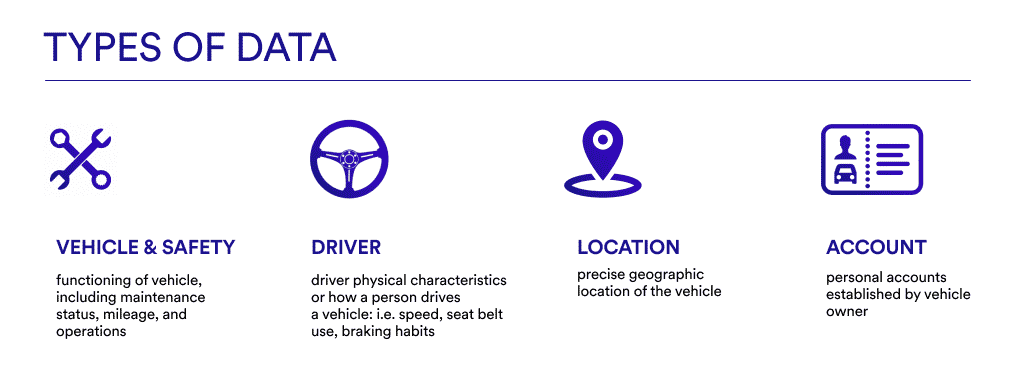Business expansion into new regions is a constant challenge for automotive companies due to complex data privacy and security requirements and regulatory rules.
Specifically, data residency compliance is now also a growing challenge for multinational companies (MNCs) in the automobile industry. Localization and residency requirements across different countries can be difficult to keep up with and even harder to execute.
The EU’s GDPR articulates a vivid example of data privacy regulation in the automobile industry. Companies in the automotive industry must comply with legislation covering the entire European Union that has extremely high requirements. In addition, there are stringent guidelines and broad accountability principles for handling consumers’ sensitive data.
Many questions keep welling up in the minds of car consumers. They include: who claims the ownership of generated data from vehicles? Can the collected data be referred to as personal data? Who can access the data?
Automobile retailers compete by gathering empirical consumer data from banks and other financial services firms. The illegal use of data by any company is a breach that can taint its brand reputation before the whole world.
Recently, the automotive industry has been the victim of many high-profile data security problems, including ransomware attacks and improperly configured web servers. The cybercriminals exploited the weaknesses to gain access to treasure troves of data managed by car dealers.
The size of the automotive industry is one of the causes of problems emanating due to automobile data security. Vehicle data collection is extensive. It spans the car owner, driver, passengers, and other road users captured by the car’s sensors.
As a result, automotive data compliance becomes challenging in a large business niche like the automotive industry. This article will educate you on automotive data compliance and potential data residency solutions.
Why is Data Residency in Automotive Important?
Knowing the types of data regulated in the automotive industry is essential. It will help you understand the importance of data residency to the automotive industry.
Automotive industry data is the critical and personal information needed in the design and manufacture of automobiles. It is required in the respective cars’ sales, use, operational, and maintenance processes.
Concerning automotive data compliance, the regulated elements include:
- The Firms – subject to regulation – those engaged in operations involving the processing of automotive data, including both conventional and online businesses related to the automotive industry. Companies that handle automotive industry data include automakers, spare parts suppliers, software companies, maintenance companies, telecommunications providers, and transportation service providers.
- Automotive data under protection is also under strict regulation. The regulated automotive data is subdivided into personal and critical data. This is to avoid excessively expanding the scope of information that can be shared or regulated.
Personal Data
Personal information in this context is similar to that under the Personal Information Protection Law. This law divides personal information into data directly related to an individual and data used to identify an individual.
Critical Data
Critical data refers to information that may cause a threat to national security, public interest, individual rights and interests, and organizational disarray. The threats can result from damage, leakage, hacking, or illegal possession and usage of classified automotive data.
Such information includes – geographical location, vehicular flow, passenger flow, or issues about the military, technology, and industries for national defense. Critical data can also include information about the economic operation, details containing faces and license information, and personal information involving more than a hundred thousand people.
The impact of geographical locations on data privacy has grown wilder. With laws like the GDPR, some local laws are not recognized, so it becomes more important that companies build services that will be compatible with different localization requirements.
The variation in the need for privacy worldwide directly compels firms to process personal information to follow regional differences. Data residency allows firms in the automobile industry to have data processing services that adhere to regional requirements.
No one can restrict vehicular movement to a single location. Complying with data residency regulations makes it possible to protect and manage personal data.
Engaging a competent data residency as a service provider helps to have the flexibility to fit into any unforeseen or unexpected policy changes. With adequate data residency compliance, businesses can process consumer information to suit the current localization requirements.
Privacy is important and is one of the most demanded services worldwide. However, the definition varies with location. Automotive data residency support ensures that the information about car owners and people associated with the car is safe. Also, it allays the fears of regional automotive data compliance issues.

Data Regulations in Automotive Industry
Different regions have set aside some automobile industry regulations to govern their respective automobile industries. Below are some of the laws:
- European Data Protection Board (EDPB) – adopted in 2020, January 28. It gives the guidelines for processing personal data in connected vehicles and mobility-related applications. It further reiterated the rights of car owners as well as people that are associated with the car.
It also addressed the data protection actions that should be used during production and the ones that should be inherent in various vehicles within the European countries. Among the listed regulations are the guidelines for sharing data outside the EU/EEA regions as well as the use of in-vehicle Wi-Fi technologies.
- Chinese Provisional Regulation on Data Security Management in the Automotive Industry – adopted on October 1, 2021. The regulation includes significant parts of China’s data protection legislation currently in effect. Data Security Law, Personal Information Protection Law, and Cybersecurity Law. The regulator of PIPL in China is the Cyberspace Administration of China (CAC).
- German Telecommunications Telemedia Data Protection Act (Telekommunikation-Telemedien-Datenschutzgesetz – TTDSG has been enforced since December 1, 2021. The German automotive data regulation is an extension and detailed upgrade of the EDPB. The advancement to EDPB can be seen in the TTDSG that vehicle manufacturers and third parties must get the consent of car owners before any location data can be retrieved from connected vehicles.
- General Data Protection Regulation (GDPR) seems to be the umbrella law for every other automobile data privacy law worldwide. Countries making other policies use the GDPR as a yardstick to make their respective peculiar versions. GDPR was passed into law on May 25, 2018, by all EU member states.
GDPR covers the processing of all EU citizens’ data. In GDPR, personal data refers to information that directly or indirectly identifies a person. The provisions of GDPR create a chance for fairness, transparency, and law-mindedness.
Once GDPR guards your region, all information about the car, the car owner, and everyone associated with the vehicle must be obtained with their respective consent. And such data must be accurate.
Data Residency for Automotive Industry From InCountry
As we mentioned above, data residency and localization for automobile data compliance are essential for manufacturers. And that is why InCountry comes into play by offering a data residency solution that is fully committed to client data security and compliance. With our certifications and technology, you can be sure to have your business running without having to toil on local data requirements.
InCountry has a proven track record of working with automotive businesses so we can share some insights on one of the case studies. The customer is a car manufacturer with full-fledged achievements in driver-passenger safety that requested a seamless integration of data residency services and record security into their sales management funnels.
Through our solution, the company’s data was saved on the InCountry platform within the respective countries of their clients. The data was also integrated into their salesforce pipeline. All of these were done with the data localization needs of their respective client countries.
If data residency is your current issue and you feel that there is a need for expert advice, then contact our sales team. We would be happy to shine a light on this matter and explain what InCountry can do for you.


